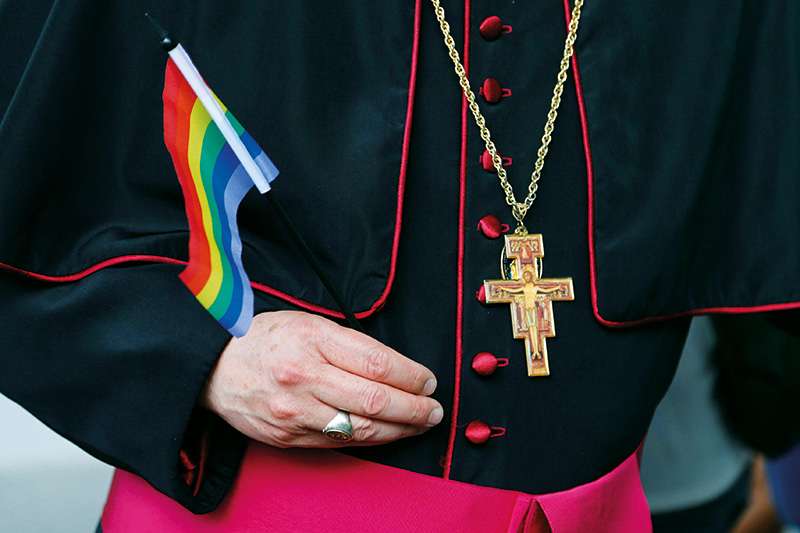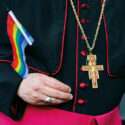By reaffirming traditional teaching on marriage, but insisting that same-sex couples are “blessable” rather than “contemptible”, Pope Francis has opened a way forward that will allow LGBT Catholics to be listened to on their own terms while maintaining the unity of the Church.
Published by The Tablet, 4 January 2024

MY HEART SANK on hearing of another Dicastery for the Doctrine of the Faith (DDF) document that impacts me and those amongst whom I minister directly, all of us precarious within the life of the Church. The DDF doesn’t make new doctrine, it sets out the status quo in more or less well-imagined ways. Its last attempt was so poorly imagined that I resorted to lampooning it in The Tablet (“How to recognise a tantrum”, 22 March 2021) in order to diminish the level of scandal caused to many gay people and those who love us. Would
I have to do the same again? I decided not to get involved in the ensuing row, but to wait for initial reactions to subside.
Slow thinking is required for “escaping labyrinths from above”, a practice that the Holy Father recommended in his annual address to the Curia a few days after Fiducia Supplicans was published. So, following his advice, and with a little “helicopter vision”, I muse that there are two “things” going on simultaneously in matters LGBT in the Church. One involves acts of process; the other, acts of governance.
Slowly but quietly – and much more through personal relationships than through official teaching – acts of process and nudges are moving us towards a place where anthropological learning about who we are is becoming non-controversial: that we LGBT people are not defective straight people, and therefore that attempts to categorise who
we are and how we live by means of negative deductions from the marital act open to procreation are both wrong and damaging. This is the “synodal” path of process.
It will take time, because changes in relationship, taking place in so many different cultures and at different speeds, cannot be skipped over by imposing new teaching without grave risk of schism. But the movement is clearly in one direction: that of learning that LGBT people are being truthful when we share what we have learned to be true about ourselves, and that
in our path of conversion to becoming sons and daughters of God, grace reaches us starting with who we are, and not in spite of our being who we are.
The recent Synod advanced this process by calling, with huge majorities, for reconsideration of our typical anthropology so as to include what we are learning inductively about being human. To that end the delegates proposed high-level meetings with guarantees of confidentiality so that frankness can emerge. Meetings at which some among us would be able to speak in the first person as witnesses. For, as is obvious, there can be no real discussion “about us” without us.
At the same time as these acts of process, we also have acts of governance, of which Fiducia Supplicans is a particularly fine-tuned example. These latter acts are in service of one end above all: fostering unity and avoiding schism. And it is in that light that
I receive the new document most warmly. Let us remember that there is no major Christian body that has been able to deal with this matter without the threat, or actuality, of schism. Those that have refused to begin to deal with it have had to give up on basic Christianity and ally themselves with violent expressions of “the powers of this world”, including criminalisation and even executions, in order to maintain a pretend purity that fools only themselves.
Given, therefore, how matters LGBT have become a “barometer” issue, a “hermeneutical flashpoint” for a whole series of other issues – culture, psychology, colonial history, changes in family structure – I have long wondered how Peter’s successor would exercise his ministry of unity in this sphere. That ministry is intrinsic to the catholicity of the Church, and, if exercised well, will have effects way beyond the visible structures of the Catholic Church.
Now I have my answer. While the process of learning what is true in this matter is going to advance far too slowly for those of us living in some countries, and far too rapidly for those living in others, advance it will. And the DDF has set out a sort of walking canopy under which we are all invited to engage the process of working through consciences: “the rules of the game” of ensuring unity and the avoidance of scandal, with the promise of a light disciplinary touch.
First: establish a firmly conservative account of the traditional teaching. Next: stretch almost to breaking point everything permissible under that account.
And this, to my mind, is the genius of Fiducia Supplicans, and why it is faithful to Pope Francis’ thinking following Amoris Laetitia (which the DDF’s 2021 Responsum manifestly was not): it climbs out of the labyrinth “from above” by using a reflection on blessings to manifest a practical Catholic account of the abundance of grace. Which it then extends in the maximum possible degree: to all of us.
How privileged I am to have done my formal theological studies in Brazil! I ministered in parishes where a tiny proportion of the population was in “properly formalised” first marriages. Where a conservative Cardinal urged me to hold lightly to canon law and avoid any moral teachings other than the Ten Commandments so as not to burden the faithful. This was far removed from the temptations to self-righteousness that are so strong in our English-speaking countries. Our religious templates were reshaped by the Reformation; and our religious leaders, even Catholic ones, are so easily seduced by moralistic and legalistic accounts of “goodness”.
So Fiducia Supplicans gives the “rules of the game” by which Catholicity is to be lived in such a way as to keep its unity: the Church is for sinners. All of us live in the mud, and yet all of us are capable of being transformed into diamonds starting from where we are. Leave official teaching where it is, at least for the moment, but never use it to judge others, for that is the way to hell. Meanwhile, learn to perceive people you might have despised as “blessable” rather than “contemptible”, and then let God’s subtle grace sort out the efficacy of blessing in their – our – lives, and what we can learn from each other about who we really are.
SO, AN ENTIRELY traditional Catholic understanding of Grace, one not hugely bothered by sin, made visible through a rich account of Blessings, the whole to be held with a light hand as regards discipline: this is the route to keeping us together in the learning process that matters LGBT are provoking all over the world. However, yes, a new note has been struck by the insistence that same-sex couples are “blessable” rather than “contemptible”.
Imagine, if you will, living in an island kingdom, maybe somewhere in the North Sea. Imagine that there are people arriving on its shores in boats. Some refer to them as “illegal immigrants”, while others call them “asylum seekers”. In the former case there is the presumption that they are not “us”, and never could be “us”, and they are to be treated as criminals and deported forthwith. In the latter case: whatever their status, wherever they are coming from, and however they got here, all is to be worked out slowly and patiently, since their desire to be “of us” may be real and legitimate and must at least be presumed to be so initially. Eventually
they may well turn out to be not only “of us”, but even among the “best of us”.
However, by contrast with any North Sea fantasy, in Christ’s Kingdom all who are resident are in fact also immigrants, and all manifest the genuine-ness of their residency by extending ladders down to others who may
arrive, not drawing them up against others whom they fear. And as they do so they discover that even the well-established rules of the Kingdom by which they live begin to change as their “we” stops being defined over against a “they” about whom they know very little. They begin to be “infected” by a greater desire to bless, and a
recognition that they have been blessed by those of whom they dared to speak well.
We’ll soon see whether Cardinal Víctor Manuel Fernández and his colleagues are up to the task of living out the promise of Fiducia Supplicans: will they be even-handed in giving nudges to different parts of the Church? Will they be as strong in
weaning African hierarchies from their reluctance to support decriminalisation (without which “blessable” rather than “contemptible” has no chance) as they are in slowing Germans down in their path to formal written rites and blessings? There will be many such tests of Fiducia Supplicans as an aid to governance in unity over the next years, many opportunities to see this adventure in action as our consciences are enjoined in coming to a shared truthfulness.
As a youth I thrilled to Chesterton’s account of Orthodoxy, and now on reading Fiducia Supplicans closely, as I witness the process of the Spirit and the ever-evolving acts of governance that serve that process, I sense something of what Chesterton meant by the “heavenly chariot” bearing the “wild truth, reeling but erect”. Game on!

